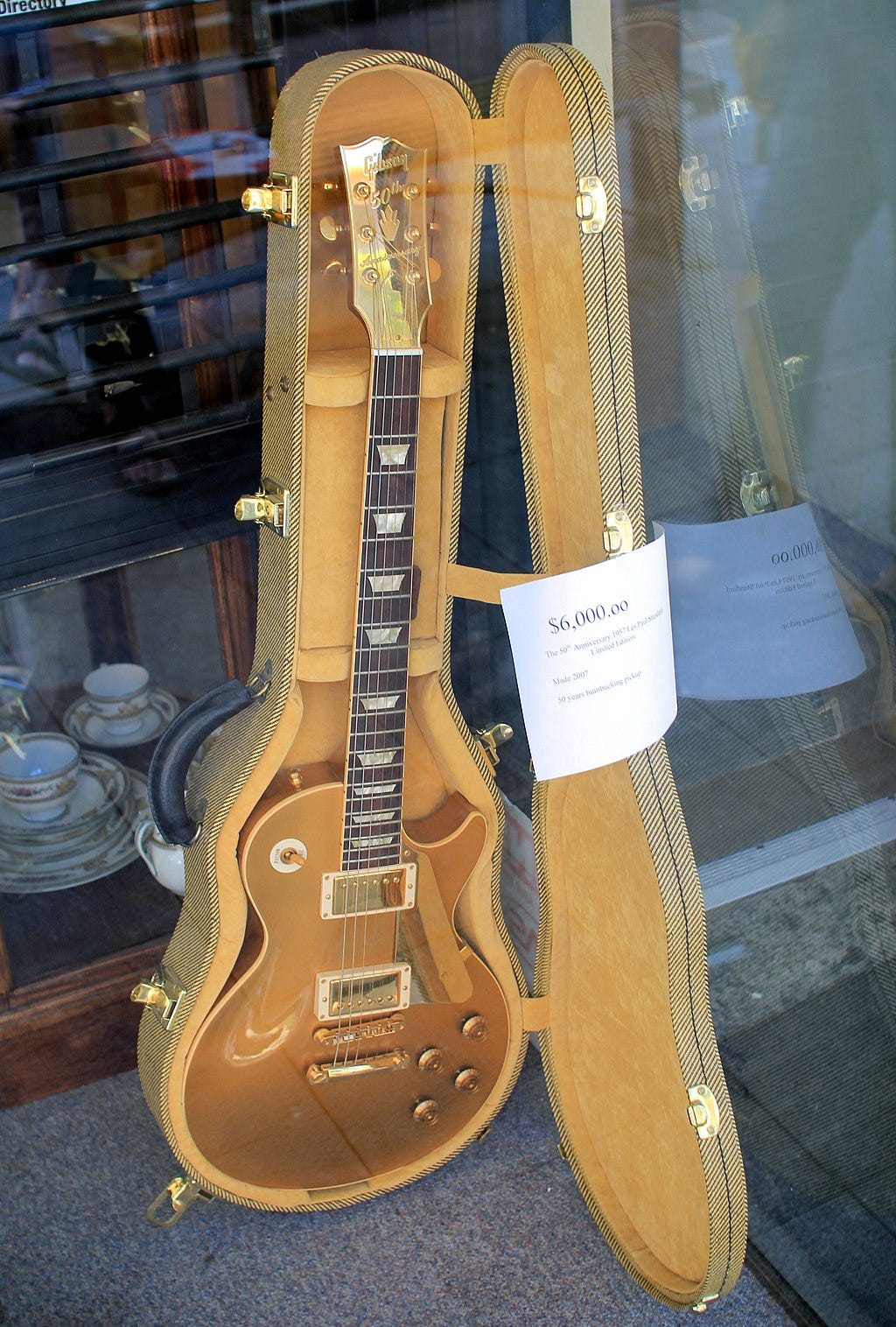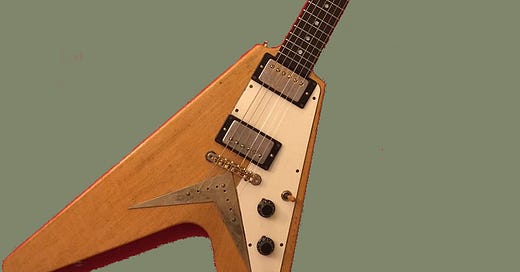Andrey was a traveling vintage guitar trader back in the days when pawn shops were filled with endless used guitars - collector's items that would eventually be worth thousands of dollars. One of Andrey’s favorite stops was Blackjack’s, a pawn shop named after the famous outlaw train robber Black Jack Ketchum. Blackjack’s had so many vintage guitars, musicians started hanging out there looking for the next great collector’s item, such as the “not for sale” electric guitar made from a toilet seat. Even famous musicians on tour would drop by, looking to find Gibson Les Pauls, Gold Tops, ‘65 Bursts, Fender Strats, Martin D-28 acoustics - and they would very often join in the afternoon in-store jam sessions. I first met Andrey at Blackjack’s.
Andrey drove a Toyota wagon made in the 70s, the era when Toyota turn signals sounded like a grandfather clock, clicking and ticking as chimes began to sound. It was a direct contrast with the long black Cadillac the Blackjack’s store owner drove. Word had it he always drove a brand new Cadillac without ever having to actually buy one, because he leased it and turned it back every year for a new model. Andrey was a traveler, and couldn’t be tied down by a lease, so the Toyota served him better. He had every inch of it packed with guitars, and he guarded it with constant surveillance. Andrey lived on the road, he did not have a home address, or a phone, but people always left messages for him at music stores known to be his hangouts.
One day, Andrey came into the store offering the owner of Blackjack’s a genuine Gibson Flying V for trade - if there was a good offer in exchange - and they made a deal. I found Andrey quite friendly, so I spent time getting to know him. His parents were doctors living in New York, originally immigrating from Eastern Europe. It was hard to ignore Andrey in any setting, because of his robust laugh, his huge curly head of hair, and his hairy chest with the shirt forming the shape of a V as it closed at his belt buckle.
After two years of outrageous growth and success, the owner of Blackjack’s brazenly decided to open a branch in San Francisco. For this task, he decided I should manage the new store, so off we went with a truck full of musical instruments. We drove straight through to “The City”, and I parked the truck on one of those steep hills, and took a long rest. The next morning, I woke up and drove the truck, with breaks belching out smoke, to the Ocean Avenue storefront that was to be our new home. In San Francisco, we could not afford housing, so the plan was for us to sleep in the back of the store. This worked reasonably well, so long as we kept it confidential. For cooking we had a hot plate, and for bathing we had a small sink.

After the grand opening, many local San Francisco musicians came by the store to see what the fuss was all about. Many of them asked about the special guitars, including the vintage Flying V, the 1968 Barney Kessel, and the Gold Top – all guitars worth thousands. After a week or so, we were surprised to see Andrey come in the door! He had traveled to San Francisco because that’s where he could find musicians with money. He even offered to work at the store for commission only. If he sold nothing, we wouldn’t have to pay him. This lasted about two weeks before he moved on. Since he had no address or phone in San Francisco, it may have been difficult for him at that point to find places to crash.
Unfortunately, after another year or so, business at the Albuquerque store began to slip, probably due to the fact that other music stores across the nation were discovering the vintage guitar market. Guitar Center – a San Francisco local store – was to eventually become a nationwide chain. I was contacted by an Albuquerque bank about debts of the Albuquerque Blackjack’s store, and was forced to close the San Francisco store. I drove a truck full of musical instruments to the bank and turned it all over to them, and a few days later the Albuquerque store owner left town in a newly purchased antique Mercedes – financed by the same bank.
Andrey, however, was able to expand his vintage guitar empire. His name became widely known among famous rock stars throughout the music world. The prices on his guitars increased exponentially, and he lived comfortably while maintaining no place of residence and no phone. However, by the early 2000s the public had become more aware of the value of vintage guitars, and manufacturers began selling re-issues of their own famous models. Andrey had to figure out what to do next. There is an old adage among musicians that asks, “What do you do if you are a 50 year-old rock star playing in a local bar?” The implication is that the local star should consider expanding their career portfolio, get back on Linkdin, and make new friends before it is too late. Andrey was at this stage.
For a while he went to Florida and tried selling time-share housing units, but that didn’t work out. With his personality and skills, sales were not a problem, but it is difficult to compete in an established setting while keeping the books straight and the ethics tight. After he was accused of defrauding investors in a Ponzi scheme, he payed the awarded penalties, denied any guilt, and left town. From there, he was off to New York, where investment trading is high risk, and the players are professional. His partnership with a jailed lawyer, his “picking up” of $40 million worth of art, and his $100,000 broker impersonation did not go well with the judge, so eventually he ended up back in Florida for “retirement.”
Black Jack Ketchum did not fare so well. He did not know his brother Sam had died while attempting to hold up a train on July 11, 1899, and three weeks later he attempted to rob the same train, at the same place, and in the same way. The train conductor saw Black Jack approaching on horseback, recognized him, grabbed a shotgun, and shot him in the arm. The next day a posse found Black Jack beside the tracks, badly wounded, and his right arm had to be amputated. He was nursed back to health and sent to Clayton, New Mexico Territory, for trial where he was sentenced to death by hanging.
Andrey knew his vintage guitars better than anyone else on the planet. He collected and sold them to people who appreciated his humor, his kindness, his robust laugh, and his capacity to negotiate and barter. His guitar collection was unrivaled, and he had a reputation of living beyond the norms of everyday life, with no residential home or phone, traveling constantly from city to city, having the pass key to the most expensive penthouses across the country - where he was always welcome.
The world is a better place when there is room for a traveling vintage guitar trader.





